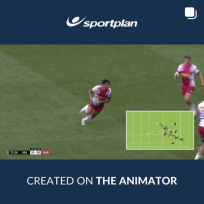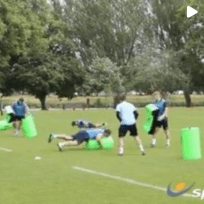Sportplan rugby has played a large role in my team's love for the game!
My fowards seem afraid to ruck and stand around the ruck while in the way of the scrum half trying to get the ball out to the backs. They also don't support the ball carrier while he is being tackled. Please help me with any suggestions!!!
I'm coaching and reffing U11 rugby and one of my players is the definitive 'big lad'. His 'strength' is his size and his power, but last weekend he didn't seem to get reffed fairly. The opposition couldn't tackle him down, one on one and when another two joined in to make a mini maul, that didn't slow him down much either. The ref then let other people join in the (one sided) struggle to tackle him down, which seemed very unfair as A) it's outside the laws of U11 rugby,, B) it makes it nigh on impossible for him to offload, C) when he is brought to ground, he has 4-5 players all over him and he got pinged for 'holding on'. He is a recent arrival to rugby and it was our first game for a couple of months, so the situation hadn't reared his head before. We are keen that he learns all of the core skills of rugby and doesn't get used as a battering ram, but after seeing a pack of hyenas trying to pull down the big fella, something just didn't seem right to me.I'd be grateful for any thoughts and opinions.
Some of my U9s players, who are experiencing contact for their first season, are showing reticence in tackling - how do you coach or get through the fear factor/element?
What drills would anybody reccomend to encourage forward running in an u8s side,whilst keeping it fun?Some players tend to crab along the pitch.
hi I help coach a under nines team where the bulk of the team are constantly trying to run through tackle after tackle.when we talk to them they all understand about off loading the ball to avoid the seven tackle turnover, but as soon as on the pitch try line fever sets in.any ideas to encourage passing of the ball
switch pass in rugby union
Simon My son's PE teacher has told him that Bridging is lieegal for the U13 to U19 group. His Club coach has been encouraging its use in games for two seasons. I can see some of the dangers but also the advantages Who is right is it banned or can it be used? Paul submitted by email
We have open this thread to continue the discussion on Player Empowerment started in the Coaches Hot Tip in this month's newsletter. If you missed it, here it is again. There is no doubt that if you want your team to be successful, you need the players to make decisions on the pitch for themselves. We know that if a team is used to getting the answers to problems on the field from the coach, it will mean that they will hesitate and look to the touchline before commiting to an action and that, of course, will be far too late! The coach can still influence things but once the game has started it is a fairly minimal influence, during the game it must be the players who react to situations as they happen and make decisions immediatley. Therefore, it is essential to have leaders in the team who feel confident about making decisons in the heat of the battle. They need to know that even a wrong call is better than no call. They should feel that their coach will support them in making a call and, if it was not necesarily the best decision, will help them make a better one next time without being too critical. Ideally, the leaders and decision makers will be at key positions in the team where they can communicate with other players as well as influencing play themselves. Key positions are Numbers%3A 2; 4/5; 8; 9; 10 and 15. This is often referred to as "The Spine or Backbone" of the team. This is not to say that a good captain and leader can't be in another position but if they are, for instance an 11 or 14, they will need good co leaders in the key positions to communicate their decisions during a game. To develop this spine to operate as leaders, the coach should involve these players in discussions about how the team are playing - making them feel some ownership and responsibility for the teams performance. They could also be involved in unit practises, for instance the 2 and 8 could Normal 0 false false false MicrosoftInternetExplorer4 occasionaly lead part of a line out practice, once the coach has agreed with them what the practice needs to achieve. The coach is not giving the players complete control but rather, allowing them to be involved in the process of team development. Obviously, the age and ability of your team can affect how far along this path you can go but, even with players as young as Under 8's, I have found that delegating some responsibility is a really effective way to build a cohesive and well functioning team! Let me know your thoughts on this type player empowerment. Good luck Simon
RFU - proposed Mini's rule changes%3A All - just a quick straw poll%3A Have any CLUBS that you are aware of officially come out in SUPPORT of these changes? If not, have they come out officially rejecting the proposed changes, or are they adopting a "wait and see" attitude? Regards Stephe
Is sealing the ball at the tackle and ruck legal again?
Making the full-back position an attractive proposition. Often over-looked, the full-back position is a vital player in anyones team if he is used and brought into the game. Does anyone have any technical/positional material to coach prospective players in this position?
Why is it important to get players to score the try when completing a handling/running drill?
We have a large squad and need a transparent way to assess our players to justify the team selection - does anyone know of, or use an assessment tool to assess skills in this age group?
I will be coaching under 10 next season and need some guidance on how to interpret the rules for the maul?
an RFU directive states that coaches should not hold pads/shields for juniors to run into during sessions, or even juniors holding pads for each other!!! I notice a lot of drills utilise pads as this was something we always used when I trained years ago! I personally think they are a good thing (especially since some of the juniors I coach are 'not small'!) BUT wondered what the general thoughts were out there in SportPlan world....
I have started an under 10s team up, and I would say about 8 from the 13 children I have , did not play rugby until about 6 months ago. Of these players, there seems to be a lot of potential, as we are scoring tries against teams, that very rarely concede tries.the problem I got with them, is that we are very poor at organising our selves in defense when the opposition has the ball, which does result in us conceding quite a few tries. We have some very good tacklers in the team. Can anyone offer some ideas on how I can get them to organise themselves? Thanks . Chris.
Positional rotation at U9 level... I originally posted this as answer to a question about squad rotation, but thought I might get a better response if I posted it as a question in its own right... I have an 8 year old at the age level you are talking about - he isn't the best player at the club by any means, but has his good moments. He loves watching the game, he has a good understanding of the way it is played (to the extent that he has often shouted at the telly over recent weeks at some of our illustrious stars when they're out of position) and he has good handling skills - to be honest he's just not brave enough in the tackle yet, but I know it'll come so I'm not making a big thing of it. However, he and a couple of others are constantly stuck on the wing, and are getting fed up with the fact that they don't get the opportunity to get involved much. The coaches seem to have their "big names" and as you say seem more interested in the short term aims of winning each game rather than trying to keep the lads interested and challenged each week. I know my son's aware that I think they should move them all around, although I have made a point of not criticising the coaches at all - I think he heard me talking about it to someone else. The coaches have talked about moving players to different positions, but haven't done it, and aren't really receptive when they are asked about it. There are two coaches, and the one that seems to have the "casting vote" is pretty autocratic and doesn't seem to accept criticism or suggestions. My son has mentioned about moving to another club, where he may or may not get more of a chance to shine, but I am not sure this is the right move as it may teach him to give up rather than sticking with something. Any thoughts please?
I have just started helping our head coach with under12's team. He wants to retire and has put me forward to be head coach next season. I am a little worried on how i should aproach training with the boys, going to a full 15 a side team on a full pitch. Any ideas would be greatly appreciated.
We have recently formed a new under 10s team. Out of the team , roughly half have played before, and the other half are new to the game. We played Sunday and were well beaten , although the side we played has a very good reputation for being a good side. I do see promise though in our team, it's just the organisational side that needs attention. Example, keeping our players from bunching, realigning in defence, etc. after doing the coaching course, I am we'll aware of trying not to pigeonhole players into positions, but I think they need this to help them organise themselves easier. Are there any drills to help with the above? Cheers, Chris.
Getting quite frustrated that my u10's are not using the space on the pitch and tend to bunch up. Despite various drills and game scenarios to force them to spread out and pass to someone in space they revert in any game to bunching up around the ball and taking it back into the thick of the opposition rather than looking left or right! Any ideas how to change their ways?

in more ways than one




Here are the 5 ways that you can kickstart your 2025 in the correct way with Sportplan and make this the best coaching year you have had!

How did the Modern Olympics originally begin and why are they so culturally significant today?

The Professionalisation of Netball is changing the game. Here is how it is helping to develop the sport.
Coaches from around the world look to Sportplan for coaching confidence.